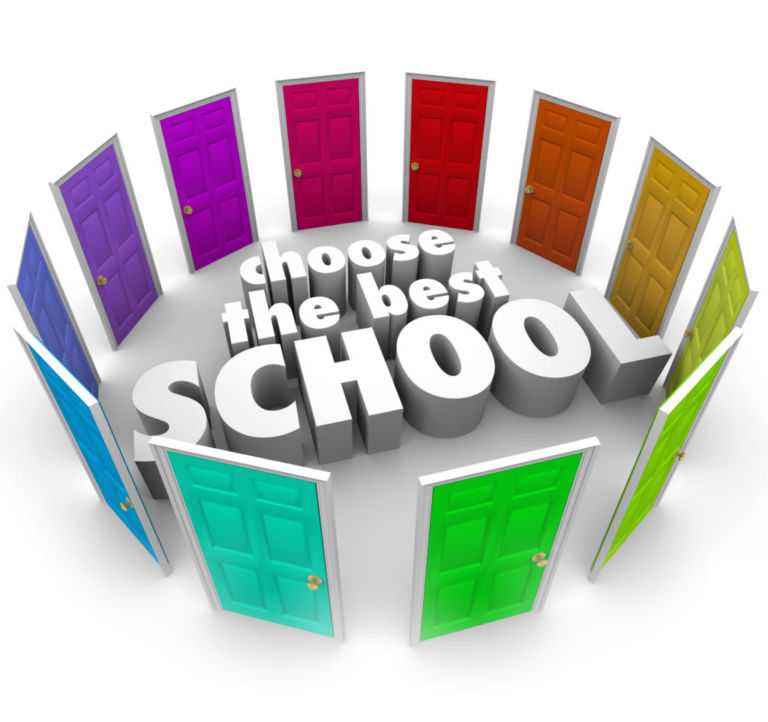Choosing the right school for your child can feel like an overwhelming task. North Carolina has so many different options for children across the state. We hope this comprehensive list will help you make the right choice in NC schools for your child.
Our friends at Parents for Educational Freedom in North Carolina have created a wonderful NC Schools Search Tool. This tool provides filters for traditional public schools, charter schools, and private schools.
Traditional Public School
As of this writing, North Carolina has 115 local school districts and over 2,500 traditional public schools. In most cases, these public schools are chosen for a student based on the primary address of the child. This means that the only way to change your child from one traditional public school to another is a change of address. North Carolina uses an A-F grading system to rate NC schools. You can find the rating of NC schools here. The general course information for each grade level and the core high school courses is available on the North Carolina Department of Public Instruction (NC DPI) Google site here. Students on a traditional high school graduation path in North Carolina need 22 credits to graduate. See the specific graduation requirements here.
Magnet Programs
Magnet programs are programs at local neighborhood NC schools that usually have a specific focus such as STEM (Science, Technology, Engineering, and Math) or the arts. Some magnet programs have their own dedicated schools that are not hosted at a neighborhood school. According to the Educational Directory and Demographical Information Exchange (EDDIE), 222 NC schools are magnet schools. Nearly all are located in urban and suburban school districts.
Middle/Early College
Many middle colleges and early colleges are considered magnet schools and are not hosted at a traditional neighborhood school. Middle/Early colleges are high schools that allow students to take courses for free at a partner college and potentially receive their associate degree upon graduation. Some of these schools even offer a “grade 13” in which a student elects to stay at the middle/early college for an additional year to complete their associate degree. Niche.com has curated a robust directory of magnet schools in the state that can be accessed here. You can access a list of middle and early colleges in this list from NC DPI.
Charter School
Charter Schools are publicly funded schools that are managed independently by non-profit boards. These public schools of choice provide another tuition-free option for students who need a change from their neighborhood school. Charter schools typically offer enrollment preferences for siblings of currently enrolled students, children of school employees, and children of board members. Many charter schools in North Carolina receive more applications than the school can accommodate, so student applications are entered into a lottery. The parents are notified if their child has been offered a spot after the randomly generated selections come in. If a child does not get a seat in the initial lottery proceedings, they may be placed on a waitlist. Self-reported data representing most charter schools in the state indicate a charter school waitlist totaling nearly 76,000 students statewide, although that figure does not account for duplicates across lists.
Keep in mind when choosing a charter school that they are not required to provide student transportation or participate in the federal school lunch program, so make sure to ask your charter school of choice what transportation and food service options are available. You can learn more about charter school admissions, lotteries, and even see a sample charter school student application in this document from NC DPI.
Private School
There are over 750 private schools to choose from in North Carolina. These schools can be secular or religious and require varying rates of tuition. Tuitions range as low as $1,850 at Trinity Baptist Academy to $58,900 at the prestigious Saint Mary’s School. The average tuition is estimated at $9,868 per year, as of 2021. Many NC schools do offer scholarships and financial aid, but the state of North Carolina also provides three options for tuition aid at private schools.
- The Opportunity Scholarship Program is a grant program for low-income students in North Carolina. Families who qualify can receive up to $4,200 per student a year in private school tuition assistance. These are the eligibility requirements according to EdChoice: “Students are eligible to receive vouchers if their household income does not exceed 133 percent of FRL ($64,465 for a family of four in 2020–21). Students must also have attended a public school during the previous semester. Kindergartners, first graders, foster children, dependents of full-time active military members and children that have been adopted in the past year qualify for vouchers without having to attend a public school.”
- The Children with Disabilities Scholarship Grant covers up to $8,000 of tuition, fees, and qualified expenses for children with a disability in North Carolina to attend a private school. You can view the eligibility requirements for this grant here.
- A Special Needs Education Savings Account (ESA) is another program in North Carolina designed to help meet the financial needs of families with disabled children in North Carolina. This program provides up to $9,000 a year to families in the form of a debit card. Children who meet certain criteria can qualify for both the Disabilities Scholarship Grant described above as well as the ESA program. See a side-by-side comparison of the eligibility criteria in this document from The North Carolina State Education Assistance Authority.
Virtual School
North Carolina has three public virtual schools with very similar names: The North Carolina Virtual Public School, North Carolina Virtual Academy, and North Carolina Cyber Academy.
The North Carolina Virtual Public School is the only virtual “school” completely operated by the state. The school is not a diploma-granting institution that students go through grade-by-grade. Instead, it is a program that expands the options of traditional public school students by offering online courses in addition to their mix of in-person classes. This includes online Advanced Placement (AP) courses, foreign languages, etc.
North Carolina Virtual Academy and North Carolina Cyber Academy are diploma-granting charter schools. They are operated entirely online and serve students all across the state. Because they are charter schools, they are completely tuition-free; however, both often have a demand that exceeds the statute-mandated cap on their admissions, so they frequently have waitlists for new students.
Home School
North Carolina is home to one of the largest shares of home schools in the country. During the 2019-2020 school year, North Carolina had 94,863 registered homeschools educating 149,173 students. A homeschool is defined in North Carolina as, “a non public school consisting of the children of not more than two families or households, where the parents or legal guardians or members of either household determine the scope and sequence of the academic instruction, provide academic instruction, and determine additional sources of academic instruction.” The educator for a homeschool must have at least a high-school diploma or its equivalent, and the homeschool must be registered with the NC Department of Administration. While homeschools get to set their own scope of instruction, students are required to take annual standardized tests. For parents looking to teach their kids a subject they don’t know themselves (like physics!), homeschool co-ops be a great help. For parents looking to create a community for their homeschoolers, co-ops are a great option. Parents can also find a community for their homeschoolers in intercollegiate athletics teams. (There is even an athletic commission for homeschooled children.)
Laboratory Schools
Laboratories are a new addition to school choice in North Carolina. The law to establish these schools was passed in 2016, and there are only handful in the state. These NC schools are part of a partnership with the UNC system to improve student performance in low-performing schools. The program uses UNC institutions with strong teacher-training programs and partners them with local school districts to manage and run the K-8 schools. Partnering universities include East Carolina University, Western Carolina University, Appalachian State University, UNC Greensboro, and UNC Wilmington. Learn more about these partnerships and find participating NC schools here.
Tarheel ChalleNGe
North Carolina Tarheel ChalleNGe Academies are designed as a dropout recovery program for students 16 through 18. These academies are part of the National Guard Youth ChalleNGe Program. NCDPI describes them as “quasi-military institutions developed by the National Guard to give at-risk teens a second chance.” ‘Cadets’ who attend these schools go through a 17-month program that allows them to earn their high school diploma/equivalency. There are two Tarheel ChalleNGe schools in North Carolina: one in Salemburg and one in New London. Learn more about these schools here.
North Carolina School of Science and Mathematics
The North Carolina School of Science and Mathematics (NCSSM) is a public residential school. This school accepts talented high school juniors and seniors and specializes in STEM education. Currently, the school only has one campus in Durham, but is building a second campus in Morganton set to open in Fall 2022. NCSSM has been called the “Best high-school education in the country,” and nearly a third of the instructors have PhDs. The school has 3 programs: residential, online, and summer programs. The residential and online programs come at no cost to the students who are accepted into them. Learn more about NCSSM here.
University of North Carolina School of the Arts
UNCSA is a high-school level arts school that provides arts education in a number of fields. Some programs run all the way from ninth grade to graduation while others cover the last years of high school education (Dance – Ballet for grades 9-12 and Contemporary for grades 10-12; Drama – Intensive one-year program for high-school seniors; Music – Instrumental for grades 9-12 and Voice for grades 11-12; Visual Arts – Grades 11-12). This school, based in Winston-Salem, has two residence halls for high schoolers, Moore Hall and Sanford Hall. It also has a host family program for students to live with a host family during their time at UNCSA, or students may commute if they choose to do so. The application and audition processes are different for each program. Information on UNCSA admissions can be found here.
Department of Defense Schools
North Carolina is home to one of the largest military populations in the country. For military families, there are options provided by the federal government to educate their children. North Carolina has two distinct DoD school communities: one serving the Fort Bragg community and one serving the Camp Lejeune community. There are eight schools serving Fort Bragg students and six serving Camp Lejeune students. Most, but not all, of these schools are located on their respective military base. The program for students of military families has expanded to offer a virtual school as well. Learn more about this virtual school and eligibility for the pilot program here.
Schools for the Blind and Deaf
North Carolina has two regional NC schools for deaf children in the state: one school is in the east, the other, the west. The eastern school is located in Wilson, NC, and the western school is located in Morganton, NC. These schools not only teach deaf students, but also provide troubleshooting for hearing aids and personal FM systems as well as speech therapy to students. The state also has one school for the blind located in Raleigh. The school teaches its students a standard educational curriculum, but also offers an independent living apartment program that develops cooking, cleaning, and personal finance skills to its students. All of these schools are public residential schools, so they are free of cost to the families whose students attend them.


